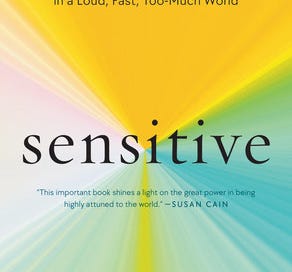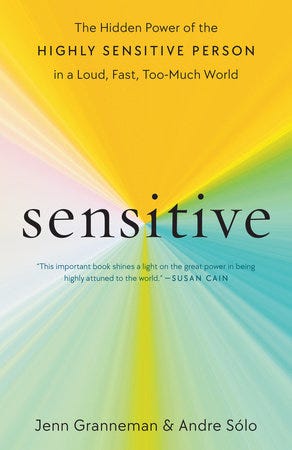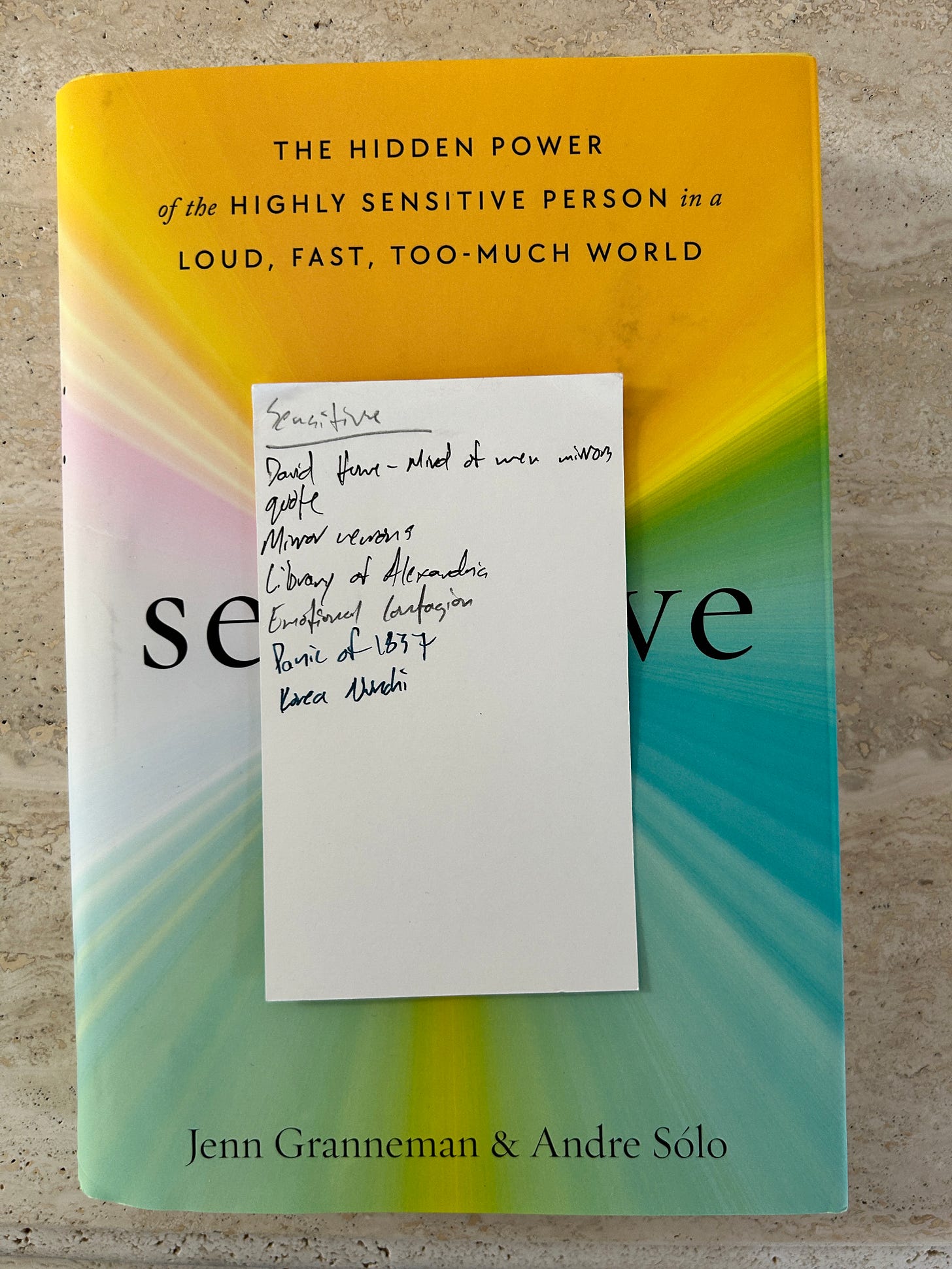I picked this up after reading Susan Cain’s seminal Quiet about introversion and its effect on our careers and lives. It made a lot of sense to me given my own introversion - and when I tell people this it surprises many of them. Introverts can still be outgoing and social, but they need time to recharge after it because it is an energy consumption equation, not an energy creation one.
Sensitive is in this vein; how does being sensitive - something like introversion that is typically seen as a hindrance professionally - actually affect careers and life? Being sensitive can cut a couple of different ways, and it affects both introvers and extroverts, so the overlap with Quiet is minimal. It was a solid book that had some good tips on handling being sensitive, but also how to manage others who happen to be sensitive.
So What Does Being Sensitive Mean?
Sensitivity tends to be bifurcated into two categories: emotional and physical. You have the emotionally sensitive person who just feels everything much more than others around them. Or you have the physically sensitive person who needs their noise cancelling headphones in 24/7 because the auditory stimulation around them is simply too much.
The reality is that these sensitivities are related and are bundled scientifically into what’s called environment sensitivities; essentially, they are how a person responds to some kind of stimulus. In short, highly sensitive people are more responsive to emotions and/or their environment than their peers. Evolutionarily, this trait was considered a positive one as it had our ancestors analyzing their constant stream of threats coming their way with higher and more detailed responsiveness.
There’s a downside to this and its overstimulation. Granneman and Sólo cite a German sociologist named Georg Simmel, whose seminal works focused on the urban environment and its effect on the human mind in the early 20th century. While Simmel wasn’t necessarily highly regarded in his time, he has emerged as a foundational urban studies voice, especially when it comes to the overstimulation of the individual in a contemporary modern urban environment.
As we all know, this overstimulation has only gotten worse since Simmel pointed it out to mixed reviews back in 1903. As advanced as we like to think we are as a species, our physiology moves much slower than our technology and that gap between what humans can do and what we think we can do continues to grow. It’s why we live in a constant state of chaos that seems to only get worse with every passing month - and people who score higher on the sensitivity scale feel this more than their less-sensitive peers.
Using Sensitivity to One’s Advantage
But while sensitivity may have obvious drawbacks, it can be harnessed in a way to drive efficacy in life and at work, and Sensitive aims to highlight that throughout its 220 pages.

There are three main types of sensitivity. There’s the sensory sensitive individual, in which crowded or busy places drain your energy quickly, or loud noises or temperature changes just feel like a lot.
Then there’s the easily excited individual - whether it’s a high degree of empathy, getting angry easily, or being a perfectionist, this sensitivity manifests in a number of different ways.
Finally there’s the aesthetically sensitive person, who is deeply moved by artistic pursuits like music or movies, or minute taste differences in wine, or simply being a daydreamer.
In full disclosure, this newsletter neatly falls into the sensory sensitivity and the easily excited individual. Living in NYC for nearly two decades certainly has helped dampen my sensory sensitivity, but I still find myself out of sorts when both kids are fighting with Cars 3 blasting on the TV for the third time that day and my wife is asking me something from the other room. And I’m certainly easily excited in that I’m a perfectionist who is quick to anger - and if you would say “Well you’re just an Irish-American from Boston, so yeah,” Granneman and Sólo point out in the book that there actually is a genetic component to sensitivity that has been discovered.
But while some of these traits of sensitivity could be seen as negatives - and they certainly have been stigmatized - they can also have huge benefits. Empathy, which is quickly becoming a huge differentiator in the leadership space and will only continue to grow in an AI world, is one of the traits consistently seen in sensitive people. There’s a cautionary piece of high empathy - avoiding emotional burnout - but with the right techniques and practices, high empathy is a supercharged trait most sensitive people possess.
Empathy may be the most obvious one, but the other “gifts” of sensitivity - as the authors refer to them - are:
Creativity - The artist as a sensitive creature trope is actually based in some reality;
Sensory Intelligence - Can also be called situational awareness, this is something sensitive folks can use to, as the kids say, lock in;
Depth of Processing - We all have access to the same information, sensitive folks can do more with it if they can tap into their sensitivity, given that sensitive brains tend to process more details;
Depth of Emotion - Feeling things more deeply can be overwhelming, but can also be used to drive one’s emotional intelligence (another key factor in today’s business world.)
The key with these gifts is ensuring they don’t become curses. Recognizing one’s own sensitivity is key to understanding these facets of the sensitive brain, setting up guardrails against the negative aspects and supercharging the good.
The Final Grade
The book is worth a read, especially for those who know they are sensitive or who suspect they might be. The use cases throughout the book are interesting, and other topics covered include raising a sensitive generation, an in-depth chapter on avoiding empathy burnout, and the passion one brings to work and how it can both help and hurt. I don’t want to have a star rating or anything like that for these books, as very rarely do I actually stop reading a book in the middle of it, so we can use my favorite thing from college and give Sensitive a pass on the pass/fail dichotomy (but it would have been a B.)
Book Grab Bag Section
As mentioned in the intro to book reviews, there are a few things this newsletter does throughout the reading of a book. In lieu of a WTF rant or an album of the week, let’s dive into the notecard and quote system that TDNBW utilizes.
The Notecard
David Hume - Mind of men mirrors quote. This came from the part of the book on empathy, quoting Hume as having said, “The minds of men are mirrors to one another.” There’s a bit more to the quote itself, but this newsletter still found it interesting.
Mirror neurons. An interesting phenomenon where neurons in the brain fire both when we conduct an action and when we simply observe someone else conducting that action. It’s a relatively new scientific discovery, and it could be the basis of human introspection.
Library of Alexandria. You know when you’re aimlessly browsing through cable at a hotel and stumble upon a movie like Step Brothers and you automatically stay on the channel for it? There are certain Wikipedia pages like that which you can always return to and know it will be a good read. This is one of them.
Emotional Contagion. An interesting concept that emtions can be contagious like diseases. It has been found to hold online on platforms like Facebook and Twitter.
Panic of 1837. What happens when you have a weakened central bank, federal bonds funded by risky foreign investment, and years of speculative real estate deals underwritten by local lenders? The global financial crisis of 2008. But also the panic of 1837. Bonus fact: real estate in the expanding West came crashing down thanks to an executive order by President Andrew Jackson essentially margin-calling real estate owners and their banks. Time really is a flat circle.
Nunchi. A fascinating concept out of Korea that has no English language equivalent, nunchi is the art of extremely subtle mood reading, but in the context of a highly structured society. Researching this will quickly plunge you into the anthropological concepts of high- and low-context cultures. From there, you can start going down a pretty interesting Wikipedia hole.
Quotes
Rifling through the pages of Sensitive, I did not earmark any pages or underline any quotes. I suspect that - as the notecard associated with the book indicates - I did not have a pencil on me as I read this mostly on the train and I hate marking my books in ink. Clearly there were quotables (the David Hume quote being one), but we’ll have to chalk this up to not having a pencil in class - not the first time for this author, and it certainly won’t be the last. That’s a fail even in the pass/fail schema.
A Note On Links
You may have noticed some of the links lead to Amazon pages. If you’re steeped in the affiliate world, you also may have noticed they are affiliate links, meaning if you click on them and buy the product linked to, this newsletter gets a cut.
I’ll be honest: I don’t want to do it on Amazon. My first choice was Barnes & Noble, which ironically was the enemy of the local bookstore eons ago but is now an ally in the fight against the commoditization of reading. But according to their affiliate program, TDNBW is not worthy of their program (and I applied twice.) They said it’s not a reflection of the content of my website, but it’s like being cut from the basketball team and being told it’s not about your basketball skills.
In any event, I have scoured other ways to do this, but unfortunately Amazon makes it a lot easier than anyone else (read: they’ll take just about anyone) and they have the inventory. That said, try to use these two resources before Amazon:
Bookshop.org: This site will help you find a local independent bookstore so you can get out of the corporate cycle of bookselling. If you live in the tri-state, just ask me and I probably have a recommendation based on where you are.
LibraryFinder.org: If you don’t want to buy, there’s always the library. This newsletter loves them. Even if you have a small library in your town, they likely partner with other libraries for inter-library loans, so don’t worry about collection size. If you don’t have a library card, get one now so you’re not scrambling when the time comes to utilize this amazing resource - a lot of them also have ebooks and streaming services you can utilize through your card. Seriously, just join your local library.
See you next week!








